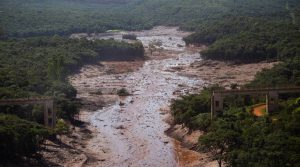Vale's Sul Superior Dam in critical condition
Brazilian mining giant Vale (NYSE:VALE) announced this weekend that the Sul Superior Dam at the Gongo Soco mine is in a critical condition when it comes to stability. This, following the work of an independent auditor, hired to evaluate the state of the structure.
The dam is located in the municipality of Bar??o de Cocais, in the southeastern Brazilian state of Minas Gerais. This is the same region where, back in January 2019, a dam at Vale's C??rrego do Feij??o iron ore mine collapsed killing hundreds and causing massive environmental destruction.


Tailings slush near the town of Brumardinho where Vale's dam collapsed. Photo by Jeso Carneiro, Flickr, CC BY-NC 2.0.
With the idea of avoiding a similar tragedy, the company launched a protocol to initiate level 3 of the Mining Dams Emergency Action Plan for Sul Superior, which is inactive and is scheduled to be decommissioned together with other nine dams.
The opposite situation is taking place at the nearby Brucutu iron ore mine, the largest in Minas Gerais state and which was ordered to halt operations on February 4.
According to Vale, the State Agency for Environment and Sustainable Development issued a Provisional Operational Authorization for Brucutu's Laranjeiras dam. Thus, activities are expected to resume in full by Sunday night.
The miner also informed that production at Brucutu will not be affected by the injunction issued on Thursday by the 1st Civil Court of Nova Lima against the Dique III dam, as the facility is located in the complex of Vargem Grande whose operations were stopped by the National Mining Agency on March 1, 2019.
Compensation actions
As it is dealing with the situation with its different dams, Vale reported that it is also taking action to support those affected by the disaster in Brumadinho.
According to the Rio-based firm, it has made 91 payments of approximately $12,790 for families that resided in the Self-Rescue Zone near the mining complex. Management has also made 61 payments of close to $4,000 for those who had their business activities affected.
Vale said it is carrying out humanitarian assistance that includes psychological and social support and emergency medical care; accommodation in hotels and provisional housing; and the supply of food, personal hygiene items and essentials, medicines, clothing, and transportation.